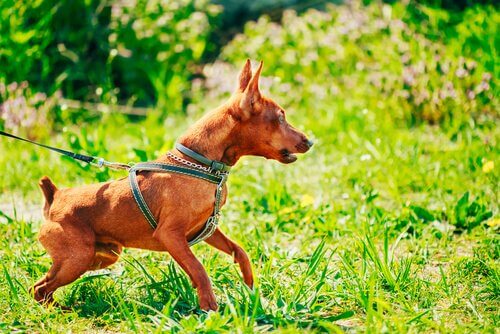Has My Dog Gone Crazy?

Even though you give your pet tons of affection and care, you may notice that his behavior has suddenly changed. Maybe he’s growling at you instead of thanking you for your pets. Or, maybe you’ve noticed him trying to chase something around that doesn’t exist, or he’s spinning around trying to bite his tail. So, you might be wondering, has my dog gone crazy? We’ll tell you what might be going on.
Why has my dog suddenly become aggressive?
Behavioral problems in dogs can have a lot of different causes. However, if they’re treated in time, they can generally be cured. Poor training and humanizing our pets can lead to aggressive attitudes towards their owners.
As a human, it might be difficult for you to understand why an animal that you treat so well, and who you treat like part of the family, and whose needs you care for, may suddenly act violently towards you.

But the problem lies in the way that you raised your pet. Remember, he’s an animal, not a person. Of course, it’s great that you treat him like another member of the family, but you can’t forget that he’s a dog. He’s not a human being and you have to respect his nature.
Also, both people and pets have to understand the house rules for coexistence. So, make sure you’re training your dog using clear rules and that there aren’t any contradictions. And, don’t hesitate to ask your vet or an animal behavior specialist for advice.
If you think that your dog has gone crazy, look for any causes for this behavior. You shouldn’t be surprised if you discover that, in some cases, you as an owner have a lot to do with his behavior.
Has my dog gone crazy?
There is other behavior that may lead you to think that your dog has gone crazy. These are known as stereotypical behaviors, which are actually nothing more than repeated behavior patterns that have the same sequence, but without any apparent purpose.
For example, if your dog starts to:
- Chase flies that don’t exist
- Walk in circles
- Constantly lick a part of his body, something that can cause a wound
- Chase his tail
- Growl at himself
- Attack his water or food bowl
Can all animals show this behavior?
These so-called stereotypical behaviors are only seen in animals that live in homes as pets, or those that are constantly in contact with humans. For example:
- Farms
- Zoos
- Hatcheries
- Kennels and shelters
Experts have never observed any of this behavior in animals that live in the wild. So, they believe that domestication and, above all, confinement, causes these abnormal behavior patterns.
So, since humans have something to do with this behavior, we should start to accept the blame in the matter. Before you start wondering, ‘has my dog gone crazy?’ you should ask yourself if you’re at fault.
Reasons for this behavior in dogs
That’s why it’s very important for you to figure out why your dog is acting this way. Keep in mind that this behavior can also go hand in hand with stress and anxiety. For example:
- Moving to a new home
- Births or deaths in the family
- A new pet in the home
- Constant fighting
- Abuse
- Keeping him tied or locked up
- Not letting him exercise enough
Physical causes of stereotypical behavior
However, there are also some organic causes that can lead to compulsive behavior in dogs. Some of them are:

- Certain intracranial diseases, such as hydrocephalus, meningoencephalitis, or tumors
- Fractures in his tail, or Cauda Equine Syndrome
- Different skin infections such as dermatitis or food allergies or stings
- Viral diseases, such as distemper
- Lesions in peripheral nerve pathways
- Certain eye problems
- Lead intoxication
- Hepatic encephalopathy
Regardless of the cause, you should talk to your veterinarian.
Even though you give your pet tons of affection and care, you may notice that his behavior has suddenly changed. Maybe he’s growling at you instead of thanking you for your pets. Or, maybe you’ve noticed him trying to chase something around that doesn’t exist, or he’s spinning around trying to bite his tail. So, you might be wondering, has my dog gone crazy? We’ll tell you what might be going on.
Why has my dog suddenly become aggressive?
Behavioral problems in dogs can have a lot of different causes. However, if they’re treated in time, they can generally be cured. Poor training and humanizing our pets can lead to aggressive attitudes towards their owners.
As a human, it might be difficult for you to understand why an animal that you treat so well, and who you treat like part of the family, and whose needs you care for, may suddenly act violently towards you.

But the problem lies in the way that you raised your pet. Remember, he’s an animal, not a person. Of course, it’s great that you treat him like another member of the family, but you can’t forget that he’s a dog. He’s not a human being and you have to respect his nature.
Also, both people and pets have to understand the house rules for coexistence. So, make sure you’re training your dog using clear rules and that there aren’t any contradictions. And, don’t hesitate to ask your vet or an animal behavior specialist for advice.
If you think that your dog has gone crazy, look for any causes for this behavior. You shouldn’t be surprised if you discover that, in some cases, you as an owner have a lot to do with his behavior.
Has my dog gone crazy?
There is other behavior that may lead you to think that your dog has gone crazy. These are known as stereotypical behaviors, which are actually nothing more than repeated behavior patterns that have the same sequence, but without any apparent purpose.
For example, if your dog starts to:
- Chase flies that don’t exist
- Walk in circles
- Constantly lick a part of his body, something that can cause a wound
- Chase his tail
- Growl at himself
- Attack his water or food bowl
Can all animals show this behavior?
These so-called stereotypical behaviors are only seen in animals that live in homes as pets, or those that are constantly in contact with humans. For example:
- Farms
- Zoos
- Hatcheries
- Kennels and shelters
Experts have never observed any of this behavior in animals that live in the wild. So, they believe that domestication and, above all, confinement, causes these abnormal behavior patterns.
So, since humans have something to do with this behavior, we should start to accept the blame in the matter. Before you start wondering, ‘has my dog gone crazy?’ you should ask yourself if you’re at fault.
Reasons for this behavior in dogs
That’s why it’s very important for you to figure out why your dog is acting this way. Keep in mind that this behavior can also go hand in hand with stress and anxiety. For example:
- Moving to a new home
- Births or deaths in the family
- A new pet in the home
- Constant fighting
- Abuse
- Keeping him tied or locked up
- Not letting him exercise enough
Physical causes of stereotypical behavior
However, there are also some organic causes that can lead to compulsive behavior in dogs. Some of them are:

- Certain intracranial diseases, such as hydrocephalus, meningoencephalitis, or tumors
- Fractures in his tail, or Cauda Equine Syndrome
- Different skin infections such as dermatitis or food allergies or stings
- Viral diseases, such as distemper
- Lesions in peripheral nerve pathways
- Certain eye problems
- Lead intoxication
- Hepatic encephalopathy
Regardless of the cause, you should talk to your veterinarian.
This text is provided for informational purposes only and does not replace consultation with a professional. If in doubt, consult your specialist.








